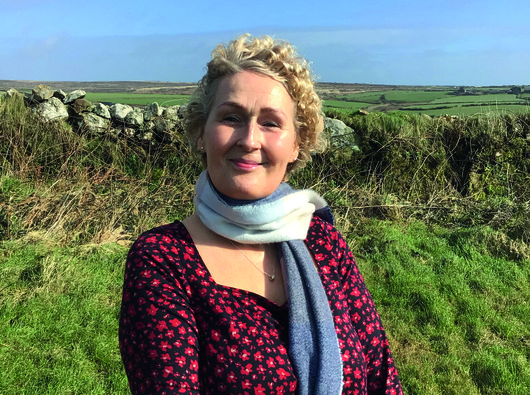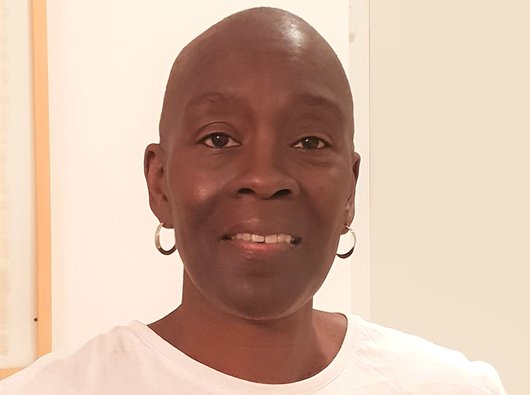Acute myeloid leukaemia (AML) treatment
Side effects of AML treatment
Treatment for AML does cause side effects, but everyone reacts to treatment differently.
Side effects depend on which drugs you have, and how you as an individual react to them. Even two people on the same treatment can have quite different experiences.
Side effects of AML treatment include:
- breathlessness
- bruising and bleeding (nosebleeds or bleeding gums)
- changes in taste or smell
- diarrhoea or constipation
- extreme tiredness (fatigue)
- feeling sick or being sick
- hair loss
- infections or fever
- infertility
- nerve damage (causing pain, numbness or weakness)
- skin changes
- sore mouth or gut.
"If you get a temperature or any symptoms of infection when you're at home, please contact the hospital straight away!
Getting an infection when you have AML is common, but if you don't get antibiotics quickly, things can quickly turn." Rebecca, diagnosed with AML in 2020.
Make sure you know the symptoms of an infection.

The most important thing to do is tell your doctor or nurse if you notice any changes in your body. You can stop many of these side effects from getting worse if you deal with them early.
Infections can quickly become serious when you have AML. Ask your medical team who you can contact urgently (and out of hours) if you think you have an infection. And make sure you know the symptoms of an infection.
Here we cover some of the common side effects of AML treatment and where to get support:
Having AML makes you more likely to get infections, because the condition and the treatment affect your immune system.
If you do get an infection, it can become serious, because your body might not be able to fight it off. In some cases infections can be life-threatening.
Ask your medical team who you can contact urgently (and out of hours) if you think you have an infection. And make sure you know the symptoms of an infection.
People with AML are at higher risk of serious illness from covid-19 (coronavirus) and other viruses like flu.
Your doctor will usually recommend a flu jab, covid vaccines and possibly a pneumonia jab. If you have AML, you shouldn't have live vaccines, but the flu, covid and pneumonia vaccines aren't live and so they're safe for you.
We have lots more information about infections and blood cancer.
Hair loss is often quite an emotional side effect to deal with. It's worth being aware that you might find it difficult or shocking at first, but this will likely pass.
Telling people that you might lose your hair before it happens can help. When people are prepared, they often react in a better way.
Telling children about hair loss in advance makes it easier for them to adjust. Letting them touch your head or ask about the hair loss might also help, as they realise it's normal and not something to feel bad about.
Your medical team can tell you about where to get a wig, if you want one. You can get a free synthetic wig from the NHS. If you want a real (human hair) wig, you'll normally have to pay for this yourself.
Wigs are not the only option. Many people prefer headwear like a hat, scarf, head wrap or bandana. You might want to choose these in advance so you are ready, and you don't need to rush to find one when the hair loss starts.
Just allowing your hair to fall out and being bald is another option. Many people find this the most comfortable option for them.
Cutting your hair short before it starts to fall out can also help you and other people adjust. Some people shave their heads completely, rather than waiting for hair to fall out.
We have lots more information about hair loss, including preparing for hair loss, caring for Afro-textured hair, and finding a wig.
However you choose to handle hair loss, there are lots of people sharing tips in our online forum.
Nausea (feeling sick) and vomiting (being sick) are common side effects with intensive AML treatments. You’ll be given anti-sickness medicines to try to prevent this effect, and in most cases these are very effective. There are many options, so tell your doctor or nurse if you still feel sick.
As well as taking anti-sickness medicines, there are self-help tips that other people with blood cancer find helpful:
- Peppermint tea, peppermints, a fizzy drink, ginger beer and ginger biscuits can help with nausea.
- Avoid fried, spicy and very sweet foods. Plain, bland foods may be easier to eat.
- Eat little amounts more often, rather than trying to eat whole meals.
- Chew your food well and sip drinks slowly.
We have lots more information about sickness and vomiting.
Chemotherapy can cause ulcers or sores in your mouth. This can be very painful for some people. There are medicines that can help, including mouthwashes, gels, tablets and sprays. You might need painkillers as well. Make sure you tell your healthcare team if your mouth is sore.
As well as taking any medicines your doctor prescribes you, there are also self-help tips from other people with blood cancer:
- Suck on ice cubes or crushed ice. Ice creams or ice lollies can also help.
- Avoid rough or hard foods like crusty bread or crisps.
- Avoid hot drinks, spicy foods, or acidic foods like tomatoes, oranges and lemons.
There are many more tips in our information about sore mouth.
AML treatments can cause reduced fertility or infertility. This means it may be more difficult or impossible to get pregnant or father a child naturally in the future.
The main treatment that causes permanent infertility is having very high doses of chemotherapy before a stem cell transplant. Most other intensive chemotherapy treatments cause temporary infertility rather than permanent. However, everyone is affected differently, so it’s not possible to say for sure how your fertility may be affected.
It’s often possible to collect and freeze sperm before starting treatment, so you can use it in the future if you want to.
Collecting eggs or ovarian tissue is not normally possible before treatment, because of the need to start treatment quickly. There is sometimes a chance to do it in between induction and conditioning treatment.
There is no right or wrong way to feel if you’re told the treatment could cause infertility. Some people feel completely devastated. For others it might feel less important.
If it is something that worries you, tell your doctor or nurse. They can talk to you about your personal situation and options.
You can talk to us if you prefer. We talk to people every day about the impact that AML has on your body and your future. Contact our Support Service and we’ll help you get the support and information you need.
Sometimes you might just need to talk to someone who understands. Other people with AML have also been through this. Visit our online forum to connect with people who have been where you are.
"Hair is part of our identity, so to lose it, you lose so much - your control and choices over how you look."
Yvonne, diagnosed with AML in 2018.
We have information about hair loss, including caring for Afro-textured hair during treatment.

Long-term side effects
Long-term side effects can last for months or years after treatment ends, but usually get better with time. Some side effects can happen years later, called late effects.
Possible long-term side effects from AML treatment include:
You might be at a higher risk of infection for a while after AML treatment, as your immune system recovers. It's really important to know if there's anything in particular you should avoid like crowded places, people who are ill, gardening or housework - check with your medical team.
Research shows that people under 60 have a slightly higher risk of getting cancer again after AML treatment. If this happens, it's normally five to ten years later. If you are over 60, your risk of cancer is similar to anyone else's. Treatment today is designed to reduce this risk as much as possible.
Certain types of chemotherapy drugs called anthracyclines, and sometimes radiotherapy, can cause damage to your heart. This side effect is uncommon now because treatment doses are planned to reduce the risk as much as possible.

Find out more about side effects
Tips and real stories about side effects like hair loss, peripheral neuropathy, brain fog, sleep problems, infection risk, nausea and sore mouth.
